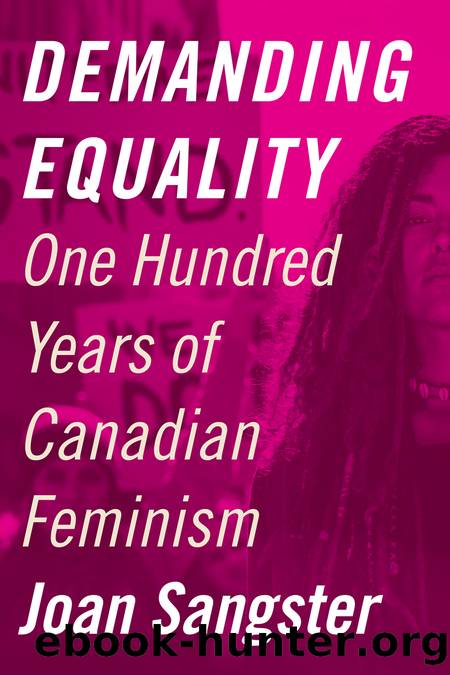Demanding Equality: One Hundred Years of Canadian Feminism by Joan Sangster

Author:Joan Sangster
Language: eng
Format: epub
Publisher: UBC Press
Anderson had a personal and political understanding of the need for child care for working mothers. The life story of daycare activist Pat Schultz offers a final glimpse of transformations in post-war culture and womenâs lives. Schultz came from an immigrant, working-class background, though one steeped in a sense of pride in the dignity of labour. It was a short step to socialist politics: in 1952, at eighteen, she joined the CCF but within a few years moved leftwards, becoming active in a revolutionary socialist group, the League for Social Action. In 1972, she joined the feminist Toronto Womenâs Caucus.
Asked in a documentary film to describe life in the 1950s and early 1960s, she recalled both the political repression of the Cold War and the overwhelming assumption of male superiority, simply taken for granted and internalized by women. âHeterosexualityâ was also assumed to be the only conceivable choice; she did not see bisexual and lesbian relations in the realm of possibility. Women imagined themselves âas second bestâ she remembers; even if they secretly thought women should be equal, âour important relationships were with men ⦠In fact, it was better to be a man. Why relate to women when they were second best?â99 As she and others recall in the documentary, there was tremendous social pressure for women to stay home with children: they were told that was âright and properâ even if it drove them literally âcrazy.â
As a single, working mother, Schultzâs experience of workplace subordination bore a striking similarity to the complaints of many women who wrote to the Royal Commission on the Status of Women. As a clerical worker, she remembers, âwe trained men who were paid more than us, then became our supervisors.â Feminism made her realize just how much women were getting âscrewed,â how angry they should be: it âmade me feel angry about all the things in my life that I didnât like but didnât know I was angry about.â The film memoir makes it clear that feminism was profoundly transformative for her, both politically and personally, though she remained a socialist feminist committed to âhumanâ liberation and working-class struggles and especially to the issue for which she became best known: quality, accessible child care for all working parents.
Schultz, Brown, Anderson, and Jewett came from different backgrounds â immigrant, racialized, working class, middle class â yet they shared a sense of suffocating gender prohibitions of the fifties. Others too recall the punishing double standard, the overwhelming assumption of heteronormativity, the limited, gendered job prospects, the dampening of ambition in girls. The sought-after honour in my high school in the sixties was to be crowned beauty queen; high-achieving girls became nurses, never doctors; and âgoodâ girls did not have âpremarital sexâ (a term we would see as quaint today), not the least because birth control and abortion were illegal, a glaring injustice addressed by the RCSW.
Download
This site does not store any files on its server. We only index and link to content provided by other sites. Please contact the content providers to delete copyright contents if any and email us, we'll remove relevant links or contents immediately.
| Africa | Americas |
| Arctic & Antarctica | Asia |
| Australia & Oceania | Europe |
| Middle East | Russia |
| United States | World |
| Ancient Civilizations | Military |
| Historical Study & Educational Resources |
Machine Learning at Scale with H2O by Gregory Keys | David Whiting(4280)
Never by Ken Follett(3917)
Fairy Tale by Stephen King(3352)
Oathbringer (The Stormlight Archive, Book 3) by Brandon Sanderson(3108)
The Man Who Died Twice by Richard Osman(3054)
Will by Will Smith(2891)
Rationality by Steven Pinker(2340)
Can't Hurt Me: Master Your Mind and Defy the Odds - Clean Edition by David Goggins(2309)
The Dark Hours by Michael Connelly(2289)
Friends, Lovers, and the Big Terrible Thing by Matthew Perry(2208)
The Dawn of Everything: A New History of Humanity by David Graeber & David Wengrow(2177)
Principles for Dealing With the Changing World Order: Why Nations Succeed and Fail by Ray Dalio(2028)
HBR's 10 Must Reads 2022 by Harvard Business Review(1828)
A Short History of War by Jeremy Black(1827)
Go Tell the Bees That I Am Gone by Diana Gabaldon(1743)
A Game of Thrones (The Illustrated Edition) by George R. R. Martin(1691)
515945210 by Unknown(1653)
Kingdom of Ash by Maas Sarah J(1651)
443319537 by Unknown(1534)
